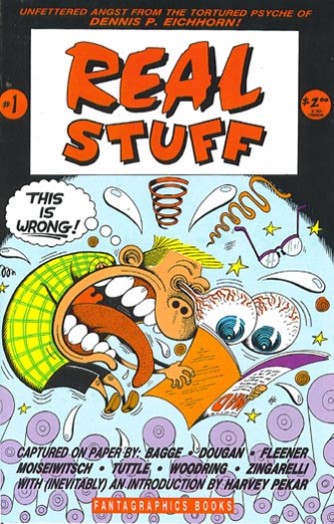 Home > CR Reviews
Home > CR Reviews Real Stuff #1
posted July 5, 2006
Real Stuff #1
posted July 5, 2006

 Creators:
Creators: Denny Eichhorn, Peter Bagge, Michael Dougan, Mary Fleener, Carol Moiseiwitsch, Holly Tuttle, Jim Woodring, Mark Zingarelli, Harvey Pekar (introduction)
Publishing Information: Fantagraphics Books, 24 pages, $2.00, 1990.
Ordering Numbers:
The conventional wisdom about Denny Eichhorn's autobiographical series is that it succeeded where some other have only antagonized because Eichhorn lived a life worth documenting. There's something to that: in just this issue alone we see a trip to jail, a sexual encounter or two, some drugs, and an encounter with a mass murderer. But there are plenty of people with crazy lives that don't make for good art. What really stands out reading
Real Stuff #1 some 16 years after its initial publication is how many quality artists Eichhorn put to work. Michael Dougan's art in the prison story is amazing: moody and frightening, full of implied violence as Eichhorn moves from observation to experience to a rattled kind of distance from it all -- an effect of discombobulation that's greater than the script or art by itself. Carol Moiseiwitsch and Mark Zingarelli draw similarly creepy stories, only with completely different visual effects: Moiseiwitsch delves into grotesques and abstract imagery while Zingarelli provides an almost painful clarity. There are gems galore throughout.
Unlike future issues, Eichhorn initial stories were models of economy, much more so than the standard tale told by introduction provider Harvey Pekar. Eichhorn proves more willing to compress time for considered effect. The end result flatters the format. There are eight stories here for your $2, and everything over a page has a recognizable narrative: set-up, progression, conclusion. While there have been
Real Stuff collections, like Peter Bagge's solo work there's something about this work in comic book form: a perfect blend of outside perspective and accomplished execution. If there's any nostalgia to be had here it's not for Eichhorn's work specifically but for a way of approaching serial literature where each book existed as a magazine that could, if necessary, be published again and again and again. They aren't; our loss.


